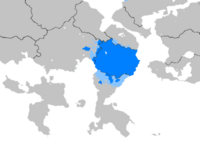Lyonheimerish: Difference between revisions
Lyooonheimer (talk | contribs) (Created page with "{{Infobox language | name = Lyonheimerish | altname = | nativename = Magylonheime | acceptance = | image = | imagesize =...") |
Lyooonheimer (talk | contribs) No edit summary |
||
| (2 intermediate revisions by the same user not shown) | |||
| Line 10: | Line 10: | ||
| pronunciation = | | pronunciation = | ||
| states = <!-- or state --> | | states = <!-- or state --> | ||
| region = [[ | | region = Southern [[Thrismari]] | ||
| creator = | | creator = | ||
| created = | | created = | ||
| Line 32: | Line 32: | ||
| fam3 = <!-- up to fam15 --> | | fam3 = <!-- up to fam15 --> | ||
| protoname = | | protoname = | ||
| ancestor = | | ancestor = [[Old Lyonheimerish]] | ||
| ancestor2 = <!-- up to ancestor5 --> | | ancestor2 = <!-- up to ancestor5 --> | ||
| standards = | | standards = | ||
| Line 44: | Line 44: | ||
| sign = | | sign = | ||
| posteriori = | | posteriori = | ||
| nation = | | nation = [[File:Screenshot_2021-03-04_085120.png|23px]] [[Lyonheimer]] <br> {{flag|Toubaze}} <br> [[File:Flag_of_Gotneska.png|23px]] [[Gotneska]] <br> [[Gwyenn]] <br> | ||
| minority = | | minority = [[File:Sarussia_399190.png|23px]] [[Sarussia]] | ||
| agency = | | agency = | ||
| iso1 = ly | | iso1 = ly | ||
| Line 80: | Line 80: | ||
| lingua_ref = | | lingua_ref = | ||
| ietf = | | ietf = | ||
| map = [[File:Screenshot 2021- | | map = [[File:Screenshot 2021-12-02 183034.png|200px]] | ||
| mapsize = | | mapsize = | ||
| mapalt = | | mapalt = | ||
| Line 92: | Line 92: | ||
}} | }} | ||
Lyonheimerish is a [[Uralic Language Family (Anteria)|Uralic]] language spoken in [[Lyonheimer]] as well as regions in neighbouring countries. It is by-far the most spoken language in the region. Lyonheimermen in living abroad also often speak Lyonheimerish, especially in neighbouring countries with first generation immigrants. | Lyonheimerish is a [[Uralic Language Family (Anteria)|Uralic]] language spoken in [[Lyonheimer]] as well as regions in neighbouring countries and a small population of speakers in the mountains in northern [[Sarussia]]. It is by-far the most spoken language in the region. Lyonheimermen in living abroad also often speak Lyonheimerish, especially in neighbouring countries with first generation immigrants. | ||
It is known for being one of the most difficult languages to master in [[Anteria]], with 1100 hours being needed on average to be fluent. | It is known for being one of the most difficult languages to master in [[Anteria]], with 1100 hours being needed on average to be fluent. | ||
Latest revision as of 18:37, 2 December 2021
| Lyonheimerish | |
|---|---|
| Magylonheime | |
| Region | Southern Thrismari |
Native speakers | 28,000,000 |
Early form | |
| Official status | |
Official language in | Gwyenn |
Recognised minority language in | |
| Language codes | |
| ISO 639-1 | ly |
| ISO 639-2 | lyo |
| ISO 639-3 | – |
 Spread of Lyonheimerish | |
Lyonheimerish is a Uralic language spoken in Lyonheimer as well as regions in neighbouring countries and a small population of speakers in the mountains in northern Sarussia. It is by-far the most spoken language in the region. Lyonheimermen in living abroad also often speak Lyonheimerish, especially in neighbouring countries with first generation immigrants.
It is known for being one of the most difficult languages to master in Anteria, with 1100 hours being needed on average to be fluent.
Phonology
Lyonheimerish has 14 vowel phonemes and 25 consonant phonemes. The vowel phonemes can be grouped as pairs of short and long vowels such as o and ó. Most of the pairs have an almost similar pronunciation and vary significantly only in their duration. However, pairs a/á and e/é differ both in closedness and length.
Consonant length is also distinctive in Lyonheimerish. Most consonant phonemes can occur as geminates.
The sound voiced palatal plosive /ɟ/, written ⟨gy⟩, sounds similar to 'd' in British English 'duty'. It occurs in the name of the country, "Magylonheimer" (Lyonheimer). It is one of three palatal consonants, the others being ⟨ty⟩ and ⟨ny⟩. Historically a fourth palatalized consonant ʎ existed, still written ⟨ly⟩.
A single 'r' is pronounced as an alveolar tap (akkora 'of that size'), but a double 'r' is pronounced as an alveolar trill (akkorra 'by that time'), like in Spanish. (Wikipedia).